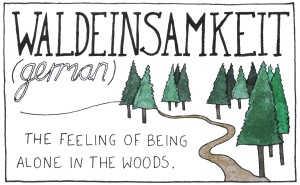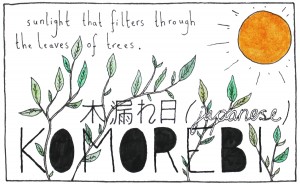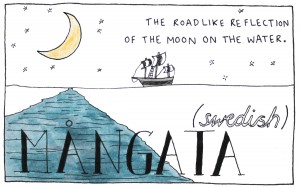Untranslatable Words
Earlier this year we were captivated by an article in the Huffington Post called Untranslatable Words by author and illustrator Ella Frances Sanders. When we found out she was writing book about the subject, we contacted her to ask her if she could tell us more.
 Writing this book was less of an actual decision and more of a cosmic happening.
Writing this book was less of an actual decision and more of a cosmic happening.
It grew (quite dramatically, like some kind of giant beanstalk) out of a blog post written at the end of August last year for the travel/storytelling startup Maptia, who I was working for at the time. They needed an extra post that week, so I innocently illustrated a list of 11 untranslatable words, blissfully unaware of the wonderful chaos that was to follow. The internets went what can only be described as ‘wild’ and within a month or two, the original post had garnered views reaching into the millions. It was entirely unintentional, but quite spectacular to witness.
 As it turned out, people had very strong language-related opinions to unleash. Hundreds upon hundreds of internet folks commented on the post—commented on the reposted post on hundreds of other websites and blogs—and volunteered their own favourite ‘untranslatable’ words, told each other that they were wrong, told me I was wrong, told the others that I was actually right, quoted dictionary entries and generally had some great linguistic conversations.
As it turned out, people had very strong language-related opinions to unleash. Hundreds upon hundreds of internet folks commented on the post—commented on the reposted post on hundreds of other websites and blogs—and volunteered their own favourite ‘untranslatable’ words, told each other that they were wrong, told me I was wrong, told the others that I was actually right, quoted dictionary entries and generally had some great linguistic conversations.
People like to talk, especially about words.
I have social media to thank for the next part of the story. But before I do, I should probably mention that I had never needed to negotiate publishing waters of any kind before—a book was quite possibly the last thing that I was thinking about, and in my mind it was more likely that I summited Everest or ended World poverty.
 But apparently it happened. The marvel of a human being who is now my editor originally contacted me on Twitter, cryptically mentioning ‘book potential’ and requesting an e-mail address from me.
But apparently it happened. The marvel of a human being who is now my editor originally contacted me on Twitter, cryptically mentioning ‘book potential’ and requesting an e-mail address from me.
It was a case of editor-before-agent (egg before chicken?) at that stage, and I thank the stars that I had found my now-agent by the time a second book editor contacted me directly. What followed was negotiating, phone calls, more negotiating and, on my part, some pacing up and down.
Much to my disappointment there was no actual handshaking, but we had a deal. The next mentionable twist in the story was that my publisher wanted to turn the entire book around in well under a year—which in publishing terms is kind of crazy-soon. Towards the end of 2013 there was a lot of back and forth, a lot of decisions and quite a bit of stress—but I actually love stress; it makes me do things faster.
I started to research material and content for the book towards the end of October, and made slow but necessary progress as Christmas came into the rearview mirror. I was living in Morocco at this point, and so the African late summer sun combined with the local definition of work (sitting doing not much of consequence all day and all night) made thinking clearly quite difficult.
I returned to the UK for Christmas and after eating an inhuman amount of mince pies, I had a creative realisation/meltdown/epiphany and scrapped most of what I’d been working on up until that point. Emotional turmoil aside, I now knew what the book needed to be. In only two months I somehow managed to create all the content, which probably had quite a lot to do with excess caffeine consumption and late nights and eye strain.
It was wonderful, and I think I’m already hooked by the whole book process—it must be one of the most satisfying processes of creation, and I actually cannot wait to hold it in my hands. Like a child or perhaps a small puppy.
The words in the book were chosen by the editor and myself from a list of over 200 untranslatables that I’d compiled near the beginning of the book timeline, and although it was terribly sad not being able to include more (we have just over 50), I don’t think we’d have ever finished.
The illustrations were a challenge in such a short space of time; sometimes I’d wake up and know exactly what the next 5 would look like and other times I painfully sketched out one word repeatedly until it became unrecognisable. We got there eventually. My main deadline came and went mid-February and now we are tying up loose ends and doing exciting things like arguing violently about what the endpapers should look like (not really, it’s actually damn good fun).
 I know that time is going to fly between now and September, and I’m squirming inside at the idea of people holding and reading and loving this book. I’m also told that the pages will be woodfree (i.e. not from precious trees), so if that’s not a good reason to buy it I don’t know what is.
I know that time is going to fly between now and September, and I’m squirming inside at the idea of people holding and reading and loving this book. I’m also told that the pages will be woodfree (i.e. not from precious trees), so if that’s not a good reason to buy it I don’t know what is.
I love that language is something that inextricably ties us all together, and it has been a privilege to illustrate those connections.
This book has already turned what I thought was going to be my life upside down in the most marvellous of ways, and I’m really very thankful for that. It has introduced me to the most welcoming and lovely bunch of literary humans, has got me reading paperwork and thinking about tax returns, and has even got me daring to let my imagination run away with future book ideas.
In short, if I’m now destined to save the world by drawing pictures on pages, then I’m going to do the opposite of half-arsing it.
—
Ella Frances Sanders is a writer and illustrator who intentionally lives all over the place, most recently Morocco and the UK, currently Switzerland. At the moment she is creating a book with real pages while drawing unrelated things for charming people. She is not afraid of questions, or bears. ‘Lost in Translation’ will be published in September 2014 by Ten Speed Press and Square Peg.
FInd out more about Ella on her website ellafrancessanders.com Follow her on pinterest ellafsanders or twitter @ellafsanders
Category: Contemporary Women Writers, On Writing
Comments (8)
Trackback URL | Comments RSS Feed
Sites That Link to this Post
- Lost in Translation - Women Writers, Women's Books : Women Writers, Women's Books | September 16, 2014




Extremely late to this party, I’m so taken with you, the author, as much, if not more than, your serendipitous little book adventure!
Your writing (blog) is a joy to read and I fiound myself smiling, often.
I will be watching your progress and am now off to find a copy of the ‘real’ book for myself.
Congratulations on a well-deserved success, and may you have many, many more.
Not at all—it is an ongoing party. But really, thank you so much for the kind words Naomi, it is wonderful to know that people are keeping an eye out. Muchas gracias!
I fell in love with the blog post and the gorgeous illustrations. The choice of words was pure poetry! I am very much looking forward to the book. The concept of untranslatable words is so annoying and yet so illuminating. Thank you for taking on this project and doing it so wonderfully!
I’m so very belated with my reply, but I loved the comments on this post, thank you! Cannot believe that it’s BOOK DAY already, oh how the times flies.
The idea of being able to express reflections on water in a single word is very appealing. I’m sure the book will be very well received with these lovely illustrations.
The whole concept of untranslatable words is fascinating – it really highlights those differences between cultures that don’t necessarily appear on the surface. How can we expect to understand one another when we have no means of expressing our concepts to people speaking a language that lacks the words for them? Perhaps I’m romanticizing, but I like to think of your study as forming a bridge between nations, a means of opening the lines of communication among the different peoples of the world. Best of luck with the book – I’m sure it will be a great success!
Awfully late in replying to this Lori, but thank you!